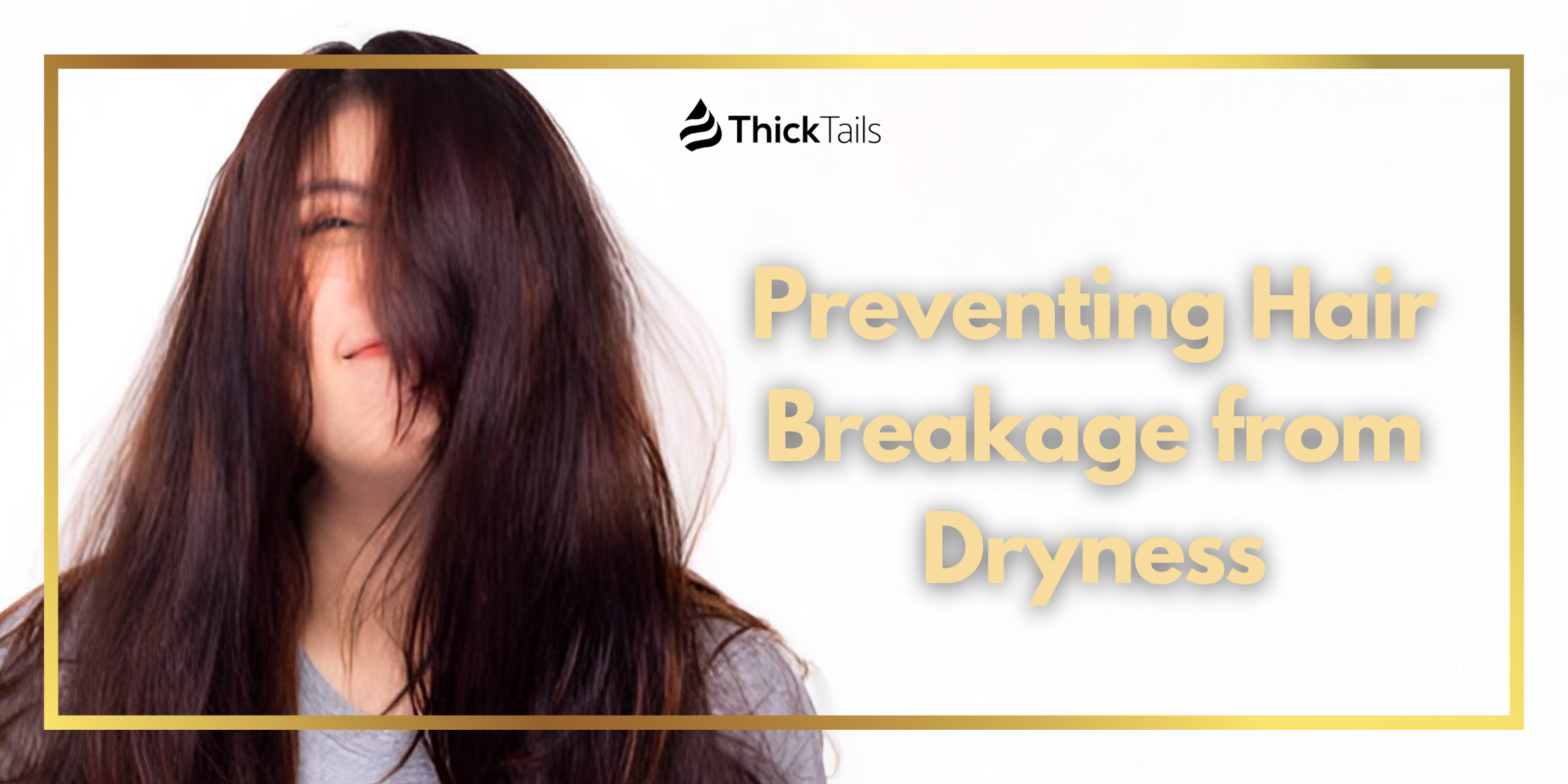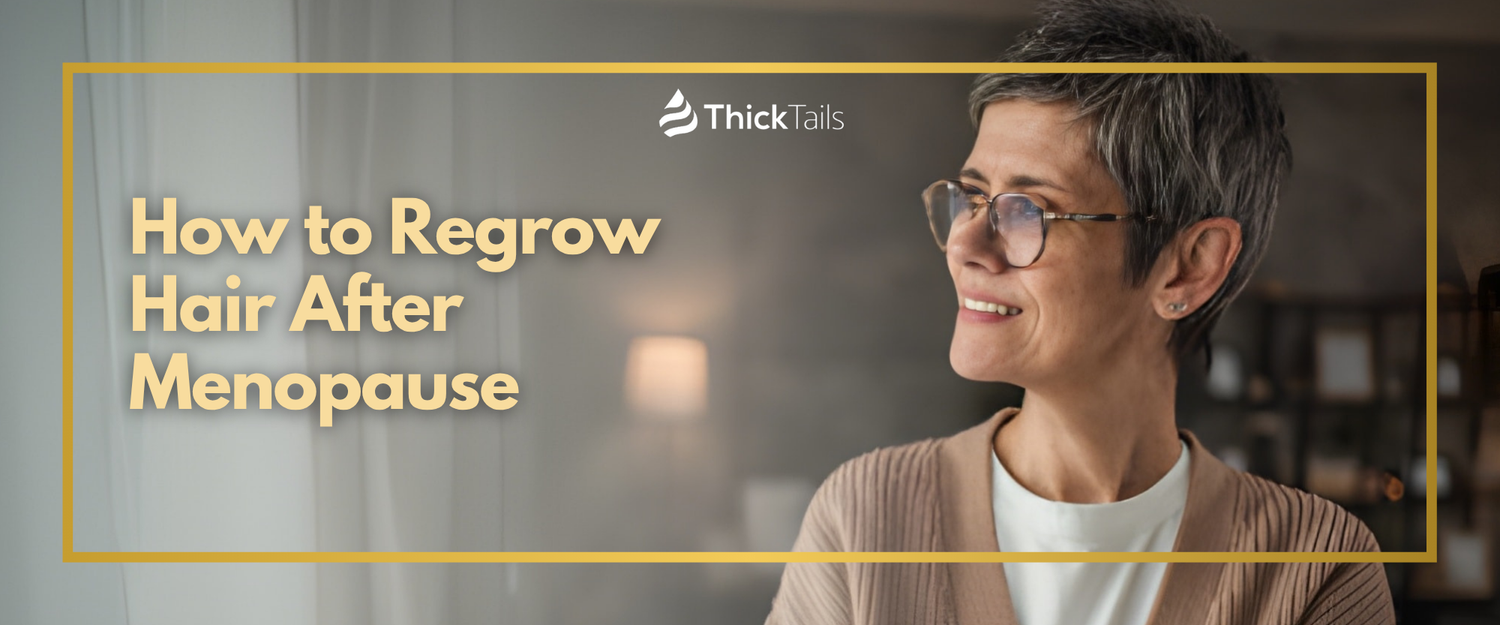Menopause, postpartum recovery and stress are all common factors that can cause significant changes in a woman's body. While these changes can manifest in different ways, one of the most well-known side effects is hair breakage from dryness. This is not only frustrating but also emotionally taxing for women who are already going through so many physical and hormonal adjustments. As someone who has personally experienced the effects of menopause and postpartum on my hair health, I understand the struggle all too well. That's why in this blog post, we will delve into the causes of hair breakage due to dryness during these periods and share some helpful tips on how to prevent it. Whether you're currently navigating through menopause or recovering from childbirth or just dealing with daily stressors, keep reading to learn more about maintaining healthy, strong hair no matter what stage of life you're in.
I. Understanding Hair Dryness

Hair dryness is a common problem faced by individuals of all ages, genders, and hair types. The causes of hair dryness can vary from environmental factors like sun exposure and harsh chemicals to lifestyle factors such as poor nutrition and excessive heat styling. Understanding the underlying causes of hair dryness can help you avoid or minimize its effects on your hair. It is important to note that dry hair not only looks dull and lifeless, but it can also be a sign of hair damage. Proper hair care, including regular conditioning, deep conditioning, and protecting your hair from heat and the sun, can help keep your tresses healthy, hydrated, and shiny. By adopting healthy hair habits, you can achieve beautiful, healthy hair and avoid the woes of hair dryness.
A. Causes of Hair Dryness: Environmental and Internal Factors
Hair is one of the defining features of an individual's appearance and understandably, it's important to want to keep it looking healthy and shiny at all times. However, due to environmental and internal factors, hair may become dry, brittle, and damaged, losing its lustre and sheen. External factors such as excessive heat, humidity, and pollution can rob the hair of its natural moisture and cause it to become dry. Additionally, internal factors such as dehydration, dietary deficiencies, and hormonal imbalances can also affect the health of your hair. Comprehensive knowledge of all the factors that cause hair dryness can help you take the necessary steps to prevent it. With the right care, you can keep your locks looking shinier and healthier than ever before.
B. Signs of Dry Hair: How to Identify Dryness Early
Dry hair can be a frustrating and discouraging experience, and it's important to know how to identify the early signs before it becomes a bigger issue. One of the most common indicators of dry hair is a lack of shine. When your hair isn't getting enough moisture, it can appear dull and lifeless. Another sign to look out for is excessive shedding or breakage, which is caused by weak, brittle hair that's more prone to damage. You may also notice split ends or rough texture, both of which are signs that your hair needs some extra hydration. By paying attention to these early warning signs, you can take the necessary steps to restore your hair's health and vitality before it's too late.
C. Impact of Dryness on Hair Health: From Dullness to Breakage
Dryness can have a significant impact on the overall health of our hair. Not only can it leave our locks looking dull and lifeless, but it can also lead to more severe issues such as breakage. When our hair lacks moisture, it becomes weakened and brittle, making it more prone to damage. This is why it's essential to take proactive measures to keep our hair hydrated and healthy. Using a good quality conditioner, avoiding over-styling with heat tools, and protecting our hair from harsh chemicals are just a few ways we can prevent dryness and maintain strong, vibrant hair. As with any aspect of our health, education is the key to making informed decisions about how we care for our hair.
II. Effective Moisturizing Techniques
Moisturizing techniques are key for maintaining healthy hair, especially when dealing with dryness. The fact of the matter is that when our hair becomes dry, it becomes more prone to breakage and damage. Fortunately, there are many effective ways to keep moisture locked in, from using the right conditioner to fully saturating the hair with water before applying product. Whether you have natural hair or chemically treated hair, there is a moisturizing technique out there that will work for you. With the right regimen, you can keep your hair looking and feeling its best for years to come.
A. Deep Conditioning Treatments: Benefits and Application
Deep conditioning treatments are an efficient and worthwhile way to nourish and strengthen your hair. They can provide a multitude of benefits, such as reducing hair dryness, increasing softness and shine, and protecting hair from damage. These treatments work by penetrating deep into the hair shaft, making your hair more resistant to breakage. It is essential to apply deep conditioning treatments regularly, especially if your hair is prone to dryness or damage. They are typically used after shampooing and conditioning for optimal results. With consistent use, you can expect to see a significant improvement in the overall health and appearance of your hair. Try incorporating deep conditioning treatments into your hair care routine to elevate your hair to its full potential.
B. Leave-in Conditioners and Serums: Hydration on the Go
In today's fast-paced world, it's often a challenge to find the time for proper hair care. With pollution, chemical treatments, and heat styling causing significant hair dryness, one of the best ways to keep our locks hydrated on the go is by using leave-in conditioners and serums. Hair serums are lightweight and can penetrate deep into the hair shaft, making them ideal for repairing dry or damaged hair. Leave-in conditioners, on the other hand, form a protective barrier over the hair cuticle and can prevent further damage from environmental factors. Using these products regularly can help improve the overall health and appearance of your hair, leaving you with a soft, silky, and shiny mane. So, whether you're in a rush to make it to the office or need to spruce up your locks during a long flight, leave-in conditioners and serums are a must-have for hydration on the go.
C. Natural Oils: Using Argan, Coconut, and Olive Oils for Moisture
Hair dryness can be a troublesome issue, causing hair to become brittle, lackluster and prone to breakage. But fear not, incorporating natural oils like argan, coconut and olive oils into your hair care routine can help rehydrate and restore luster to your hair. Argan oil, for example, is loaded with antioxidants that work to repair damage caused by environmental stressors. Meanwhile, coconut oil is rich in essential fatty acids that can penetrate the hair shaft, strengthening and moisturizing from within. Olive oil is another powerful option, containing omega-3 fatty acids that work to nourish the scalp and moisturize the hair. By using natural oils as part of your hair care routine, you can say goodbye to dry, damaged hair and hello to a luscious, shiny mane.
III. Daily Hair Care Practices

Hair dryness is a common problem faced by many individuals, and the way we care for our hair on a daily basis plays a crucial role in maintaining its health. There are several effective daily hair care practices that can help combat hair dryness and keep your locks looking healthy and radiant. One of the most important actions you can take is to use a moisturizing shampoo and conditioner that is formulated specifically for dry hair. Another helpful practice is to avoid using hot water when washing your hair as it can strip away natural oils and exacerbate dryness. Moreover, reducing the frequency of heat styling tools like straighteners and blow dryers can also help minimize damage and dryness. By implementing these simple daily hair care practices, you can say goodbye to dryness and hello to healthier, more vibrant hair.
A. Choosing the Right Shampoo and Conditioner: Ingredients to Look For
When it comes to choosing the right shampoo and conditioner, it's important to pay attention to the ingredients included in the product. If you're prone to hair dryness, it's especially crucial to select the right formula to keep your hair hydrated and healthy. Opt for shampoos and conditioners that contain ingredients such as coconut oil, argan oil, and shea butter to help moisturize your hair. Additionally, it's wise to avoid products that contain sulfates or alcohol, as these can strip your hair of its natural oils and lead to further dryness. By carefully choosing the right shampoo and conditioner with the right ingredients, you can help keep your hair looking its best.
B. Protective Hairstyles: Minimizing Damage and Retaining Moisture
When it comes to taking care of our hair, minimizing damage and retaining moisture are key factors to consider. Protective hairstyles are a great way to accomplish this goal. These styles help to tuck away your hair, which minimizes daily manipulation and protects it from harsh elements, such as wind and sun. Additionally, protective hairstyles provide a barrier against the frequent use of heat, which can contribute to hair dryness. By keeping your hair moisturized and protected, you can promote healthier, stronger hair. While there are many protective hairstyles to choose from, it's important to select the one that works best for your hair type and lifestyle. With the right technique and the proper care, you can achieve beautiful, healthy hair that is protected from damage.
C. Hydrating Diet: Importance of Water and Nutrient-Rich Foods
Maintaining a hydrating diet is crucial for overall health and wellness. When it comes to hair health specifically, consuming enough water and nutrient-rich foods can prevent dryness and promote shine. Dehydration can cause hair to become brittle and prone to breakage, leading to unsightly split ends and thinning. To combat this, it's important to not just drink water, but also eat foods that are high in water content, like cucumbers and watermelon. Additionally, incorporating foods rich in vitamins and minerals like biotin, iron, and omega-3 fatty acids can boost hair health from the inside out. While hair supplements may seem like an easy solution, a diet that prioritizes hydration and nutrient-dense foods can provide benefits far beyond just hair health.
After diving into the world of hair dryness, it's clear that this hair issue is more complex than we may have thought. From environmental factors like pollution and heat styling, to internal factors such as genetics and health conditions, there are a plethora of reasons why our hair may become dry. But with understanding comes power, and armed with the knowledge of these causes and signs of dryness, we can now take proactive steps to combat it. From deep conditioning treatments and leave-in products to natural oils and a hydrating diet, there are numerous effective moisturizing techniques that can help restore moisture and life to our locks. And when it comes to daily hair care practices, choosing the right shampoo and conditioner with nourishing ingredients, opting for protective styles, and staying hydrated both inside and out will make all the difference in achieving healthy, hydrated hair. So next time you notice your strands feeling dull or brittle, remember these tips and put them into action for luscious locks that radiate vitality. Our hair deserves love and care just as much as any other part of our body, so let's show it some TLC by implementing these proven techniques for keeping our tresses healthy and hydrated. Here's to saying goodbye to dryness and hello to gorgeous, moisturized hair!








